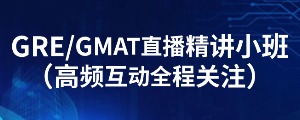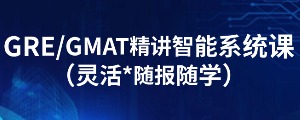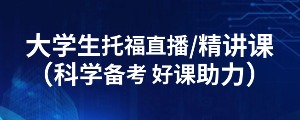选课中心
7099人选课
GRE公开讲座
0元
GMAT公开讲座
0元
一对一体验课
99元
GRE模考网站
10000人
托福备考练习HOT
39209人预约
GRE辅导课程
17537 人
GMAT辅导课程
17537 人
托福辅导课程
17537 人
【定制】1v1
私人订制
资料下载
考前冲刺

扫码关注掌握一手留学资讯
回复XDF免费领
水平测试和备考资料

扫码关注公众号
严格限制使用抗生素
SECTION B
The Food and Drug Administration has recently proposed severe restrictions on the use of antibiotics to promote the health and growth of meat animals. Medications added to feeds kill many microorganisms but also encourage the appearance of bacterial strains that are resistant to anti-infective drugs. Already, for example, penicillin and the tetracyclines are not as effective therapeutically as they once were. The drug resistance is chiefly conferred by tiny circlets of genes, called plasmids, that can be exchanged between different strains and even different species of bacteria. Plasmids are also one of the two kinds of vehicles (the other being viruses) that molecular biologists depend on when performing gene transplant experiments. Even present guidelines forbid the laboratory use of plasmids bearing genes for resistance to antibiotics. Yet, while congressional debate rages over whether or not to toughen these restrictions on scientists in their laboratories, little congressional attention has been focused on an ill-advised agricultural practice that produces known deleterious effects.
17. In the passage, the author is primarily concerned with
(A) discovering methods of eliminating harmful microorganisms without subsequently generating drug-resistant bacteria
(B) explaining reasons for congressional inaction on the regulation of gene transplant experiments
(C) describing a problematic agricultural practice and its serious genetic consequences
(D) verifying the therapeutic ineffectiveness of anti-infective drugs(C)
(E) evaluating recently proposed restrictions intended to promote the growth of meat animals
18. According to the passage, the exchange of plasmids between different bacteria can results in which of the following?
(A) Microorganisms resistant to drugs
(B) Therapeutically useful circlets of genes
(C) Anti-infective drugs like penicillin
(D) Viruses for use by molecular biologists(A)
(E) Vehicles for performing gene transplant experiments
19. It can be inferred from the passage that the author believes that those in favor of stiffening the restrictions on gene transplant research should logically also
(A) encourage experiments with any plasmids except those bearing genes for antibiotic resistance
(B) question the addition of anti-infective drugs to livestock feeds
(C) resist the use of penicillin and tetracyclines to kill microorganisms
(D) agree to the development of meatier livestock through the use of antibiotics(B)
(E) favor congressional debate and discussion of all science and health issues
20. The author’s attitude toward the development of bacterial strains that render antibiotic drugs ineffective can best be described as
(A) indifferent
(B) perplexed
(C) pretentious
(D) insincere(E)
(E) apprehensive
During adolescence, the development of political ideology becomes apparent in the individual; ideology here is defined as the presence of roughly consistent attitudes, more or less (more or less: adv.或多或少) organized in reference to a more encompassing, though perhaps tacit, set of general principles. As such (as such: adv.同样地, 同量地), political ideology is dim or absent at the beginning of adolescence. Its acquisition by the adolescent, in even the most modest sense, requires the acquisition of relatively sophisticated cognitive skills: the ability to manage abstractness, to synthesize and generalize, to imagine the future. These are accompanied by a steady advance in the ability to understand principles.
The child’s rapid acquisition of political knowledge also promotes the growth of political ideology during adolescence. By knowledge I mean more than the dreary “facts,” such as the composition of county government that the child is exposed to in the conventional ninth-grade civics course. Nor do I mean only information on current political realities. These are facets of knowledge, but they are less critical than the adolescent’s absorption, often unwitting, of a feeling for those many unspoken assumptions about the political system that comprise the common ground of understanding—for example, what the state can appropriately demand of its citizens, and vice versa (vice versa: adv.反之亦然), or the proper relationship of government to subsidiary social institutions, such as the schools and churches. Thus political knowledge is the awareness of social assumptions and relationships as well as of objective facts. Much of the naiveté that characterizes the younger adolescent’s grasp of politics stems not from an ignorance of “facts” but from conventions of the system, of what is and is not customarily done, and of how and why it is or is not done.
Yet I do not want to overemphasize the significance of increased political knowledge in forming adolescent ideology. Over the years I have become progressively disenchanted about the centrality of such knowledge and have come to believe that much current work in political socialization, by relying too heavily on its apparent acquisition, has been misled about the tempo of political understanding in adolescence. Just as young children can count numbers in series without grasping the principle of ordination, young adolescents may have in their heads many random bits of political information without a secure understanding of those concepts that would give order and meaning to the information.
Like magpies, children’s minds pick up bits and pieces (bits and pieces: n.零碎) of data. If you encourage them, they will drop these at your feet—Republicans and Democrats, the tripartite division of the federal system, perhaps even the capital of Massachusetts. But until the adolescent has grasped the integumental function that concepts and principles provide, the data remain fragmented, random, disordered.
21. The author’s primary purpose in the passage is to
(A) clarify the kinds of understanding an adolescent must have in order to develop a political ideology
(B) dispute the theory that a political ideology can be acquired during adolescence
(C) explain why adolescents are generally uninterested in political arguments
(D) suggest various means of encouraging adolescents to develop personal political ideologies(A)
(E) explain why an adolescent’s political ideology usually appears more sophisticated than it actually is
22. According to the author, which of the following contributes to the development of political ideology during adolescence?
(A) Conscious recognition by the adolescent of his or her own naiveté
(B) Thorough comprehension of the concept of ordination
(C) Evaluation by the adolescent of the general principles encompassing his or her specific political ideas
(D) Intuitive understanding of relationships among various components of society(D)
(E) Rejection of abstract reasoning in favor of involvement with pragmatic situations
23. The author uses the term “common ground of understanding” (line 27) to refer to
(A) familiar legislation regarding political activity
(B) the experiences that all adolescents share
(C) a society’s general sense of its own political activity
(D) a society’s willingness to resolve political tensions(C)
(E) the assumption that the state controls social institutions
24. The passage suggests that, during early adolescence, a child would find which of the following most difficult to understand?
(A) A book chronicling the ways in which the presidential inauguration ceremony has changed over the years
(B) An essay in which an incident in British history is used to explain the system of monarchic succession
(C) A summary of the respective responsibilities of the legislative, executive, and judicial branches of government
(D) A debate in which the participants argue, respectively, that the federal government should or should not support private schools(D)
(E) An article detailing the specific religious groups that founded American colonies and the guiding principles of each one
25. It can be inferred from the passage that the author would be most likely to agree with which of the following statements about schools?
(A) They should present political information according to carefully planned, schematic arrangements.
(B) They themselves constitute part of a general sociopolitical system that adolescents are learning to understand.
(C) If they were to introduce political subject matter in the primary grades, students would understand current political realities at an earlier age.
(D) They are ineffectual to the degree that they disregard adolescents’ political naiveté.(B)
(E) Because they are subsidiary to government their contribution to the political understanding of adolescent must be limited.
26. Which of the following best summarizes the author’s evaluation of the accumulation of political knowledge by adolescents?
(A) It is unquestionably necessary, but its significance can easily be overestimated.
(B) It is important, but not as important as is the ability to appear knowledgeable.
(C) It delays the necessity of considering underlying principles.
(D) It is primarily relevant to an understanding of limited, local concerns, such as county politics.(A)
(E) It is primarily dependent on information gleaned from high school courses such as civics.
27. Which of the following statements best describes the organization of the author’s discussion of the role of political knowledge in the formation of political ideology during adolescence?
(A) He acknowledges its importance, but then modifies his initial assertion of that importance.
(B) He consistently resists the idea that it is important, using a series of examples to support his stand.
(C) He wavers in evaluating it and finally uses analogies to explain why he is indecisive.
(D) He begins by questioning conventional ideas about its importance, but finally concedes that they are correct.(A)
(E) He carefully refrains from making an initial judgment about it, but later confirms its critical role.

 资料下载
资料下载
2024中国学生留学备考白皮书下载
发布时间:2024-05-20添加新东方在线美研助教号
回复【资料】获取
GRE高频真词表资料下载
发布时间:2024-05-20添加新东方在线美研助教号
回复【资料】获取
GRE数学-OG官方150题资料下载
发布时间:2024-05-20添加新东方在线美研助教号
回复【资料】获取
GRE数学常用词汇资料下载
发布时间:2024-05-20添加新东方在线美研助教号
回复【资料】获取
2024GRE数学重点突破资料下载
发布时间:2024-05-20添加新东方在线美研助教号
回复【资料】获取
2024GMAT模考题&答案资料下载
发布时间:2024-05-20添加新东方在线美研助教号
回复【资料】获取
GRE&GMAT阅读难句教程资料下载
发布时间:2024-05-20添加新东方在线美研助教号
回复【资料】获取
2024年托福考试重点题目资料下载
发布时间:2024-05-20添加新东方在线美研助教号
回复【资料】获取
托福独立口语必练70题资料下载
发布时间:2024-05-20关注新东方在线美研订阅号
回复【GRE】获取
托福口语综合口语精听50题节选资料下载
发布时间:2024-05-20添加新东方在线美研助教号
回复【资料】获取
托福听力1200词资料下载
发布时间:2024-05-20添加新东方在线美研助教号
回复【资料】获取
托福写作综合写作练习册-听力精听25篇资...
发布时间:2024-05-20添加新东方在线美研助教号
回复【资料】获取
托福写作综合写作练习册-阅读改写50篇资...
发布时间:2024-05-20添加新东方在线美研助教号
回复【资料】获取
托福阅读核心词表1500词(前30天优先必学...
发布时间:2024-05-20添加新东方在线美研助教号
回复【资料】获取

添加美研助教号,
回复【GRE】获取备考必看资料包

 推荐阅读
推荐阅读
备考GRE,对大部分同学来说也是一个新挑战,尤其是阅读部分,如何在有限的时间内大幅提高阅读速度呢? 快来本文看看吧。
本文今天为大家带来的是gre考试中easy等级难度的阅读片段,一起来看看吧!
2022年3月13-19日GRE阅读题回忆及答案(六)来啦,来本文和新东方在线GRE一起来看看详细信息吧。
2022年3月13-19日GRE阅读题回忆及答案(五)来啦,来本文和新东方在线GRE一起来看看详细信息吧。
2022年3月13-19日GRE阅读题回忆及答案(四)来啦,来本文和新东方在线GRE一起来看看详细信息吧。
2022年3月13-19日GRE阅读题回忆及答案(三)来啦,来本文和新东方在线GRE一起来看看详细信息吧。
2022年3月13-19日GRE阅读题回忆及答案(二)来啦,来本文和新东方在线GRE一起来看看详细信息吧。
2022年3月13-19日GRE阅读题回忆及答案(一)来啦,来本文和新东方在线GRE一起来看看详细信息吧。
2022年2月13日GRE阅读题回忆及答案来啦,来本文和新东方在线GRE一起来看看详细信息吧。
2022年2月13日GRE阅读题回忆及答案来啦,来本文和新东方在线GRE一起来看看详细信息吧。


 GRE/GMAT直播精讲小班
GRE/GMAT直播精讲小班
 GRE/GMAT精讲智能系统课
GRE/GMAT精讲智能系统课
 托福直播/精讲课(30天/60天)
托福直播/精讲课(30天/60天)
添加美研助教号,
回复【GRE】获取备考必看资料包

 资料下载
资料下载
添加新东方在线美研助教号
回复【资料】获取
添加新东方在线美研助教号
回复【资料】获取
添加新东方在线美研助教号
回复【资料】获取
添加新东方在线美研助教号
回复【资料】获取
添加新东方在线美研助教号
回复【资料】获取
添加新东方在线美研助教号
回复【资料】获取
添加新东方在线美研助教号
回复【资料】获取
添加新东方在线美研助教号
回复【资料】获取
关注新东方在线美研订阅号
回复【GRE】获取
添加新东方在线美研助教号
回复【资料】获取
添加新东方在线美研助教号
回复【资料】获取
添加新东方在线美研助教号
回复【资料】获取
添加新东方在线美研助教号
回复【资料】获取

 阅读排行榜
阅读排行榜
 相关内容
相关内容